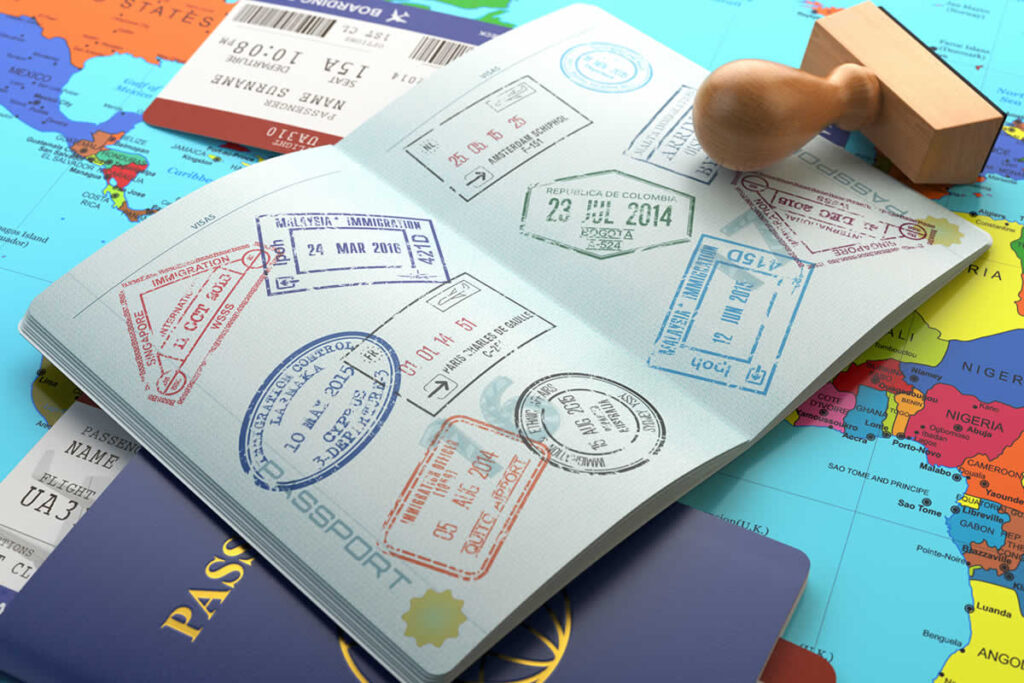Japan is a country that has always been a popular destination for tourists. Known for its rich culture, delicious food, and stunning scenery, it’s no wonder why people from all over the world flock to Japan every year. However, in recent years, Japan has also become a popular destination for digital nomads. These are people who work remotely and use technology to perform their jobs from anywhere in the world.
One of the reasons why Japan is such an attractive destination for digital nomads is its reliable infrastructure. With high-speed internet and a well-developed transportation system, it’s easy to stay connected and get around the country. Additionally, Japan’s culture of respect and punctuality makes it a great place for remote workers who need a quiet and professional environment to work in.
Despite its many benefits, working as a digital nomad in Japan does come with some challenges. For example, the language barrier can be difficult to navigate for those who don’t speak Japanese.
Additionally, the cost of living in Japan is relatively high compared to other countries in Asia. However, for those who are willing to put in the effort, working as a digital nomad in Japan can be a rewarding and unforgettable experience.
Understanding the Concept of a Digital Nomad
A digital nomad is someone who uses technology to work remotely and is not tied to a specific location. This allows them to travel and work from anywhere in the world. The concept of being a digital nomad has become increasingly popular in recent years, as more and more people are seeking a flexible and independent lifestyle.
Digital nomads typically work in industries such as software development, writing, design, marketing, and consulting. They use laptops, smartphones, and other mobile devices to stay connected and productive while on the move. They often work from co-working spaces, cafes, or other locations with reliable Wi-Fi.
One of the key benefits of being a digital nomad is the ability to explore new places and cultures while maintaining a career. This can be a great way to gain new experiences, learn new skills, and broaden one’s perspective. However, it’s important to note that being a digital nomad is not always easy. It can require a lot of discipline, organization, and self-motivation to stay productive while traveling.
Overall, the concept of being a digital nomad is a growing trend that allows people to work and travel on their own terms. It offers a unique opportunity to combine work and leisure in a way that was not possible before the advent of modern technology.
Why Japan ─ 6 Advantages of Being a Digital Nomad in Japan

Source: digitalnomads.world
Japan is a popular destination for digital nomads due to its unique blend of traditional and modern culture, efficient transportation system, and advanced technology. Here are some advantages of being a digital nomad in Japan (source: TheDigitalNomad):
1. High-speed internet
Japan is known for having one of the fastest and most reliable internet connections in the world. This is essential for digital nomads who rely on internet access to work remotely. Most cafes, co-working spaces, and accommodations offer free Wi-Fi, making it easy to stay connected.
2. Efficient transportation system
Japan’s transportation system is renowned for being punctual, safe, and efficient. The extensive network of trains and buses makes it easy to travel around the country, whether for work or leisure. Digital nomads can take advantage of the Japan Rail Pass, which provides unlimited travel on most trains, buses, and ferries for a fixed period.
3. Co-working spaces
Japan has a growing number of co-working spaces that cater to digital nomads. These spaces offer a variety of amenities, such as high-speed internet, meeting rooms, and printing services. They also provide opportunities to network with like-minded individuals and attend events and workshops.
4. Cultural experiences
Japan’s rich culture and history provide endless opportunities for digital nomads to explore and learn. From visiting ancient temples and shrines to experiencing traditional festivals and cuisine, there is always something new to discover. This can help break up the monotony of work and provide inspiration for future projects.
5. Safety
Japan is known for being one of the safest countries in the world. Crime rates are low, and the streets are clean and well-lit, making it easy to explore even at night. This provides peace of mind for digital nomads who may be traveling alone or carrying expensive equipment.
Overall, Japan offers a unique and rewarding experience for digital nomads. With its efficient transportation system, high-speed internet, and rich culture, it’s no wonder why so many choose to work remotely from this fascinating country.
6. Ski Resorts in Japan
Japan’s ski resorts offer a unique blend of work and play for digital nomads. Nestled among breathtaking landscapes, areas like Hokkaido and Nagano provide world-class skiing alongside reliable internet and cozy accommodations. These destinations not only allow for thrilling outdoor activities but also serve as serene workspaces. Imagine wrapping up a project with views of snow-covered peaks, then unwinding on pristine slopes. Japan’s ski resorts cater to the adventurous spirit of digital nomads, blending the thrill of winter sports with the necessities of remote work, creating an unparalleled workation experience in the heart of winter’s beauty. To learn about ski resorts in Japan, check out Club Med.
Challenges Faced by Digital Nomads in Japan
Digital nomads in Japan face a unique set of challenges that can make working remotely difficult. Here are some of the most common challenges faced by digital nomads in Japan:
Language Barrier
One of the biggest challenges faced by digital nomads in Japan is the language barrier. While English is spoken in some areas, many people in Japan do not speak it fluently. This can make it difficult for digital nomads to communicate with locals, especially when it comes to business transactions and legal matters.
High Cost of Living
Japan has a reputation for being an expensive country to live in, and this is especially true in major cities like Tokyo and Osaka. Digital nomads may find it difficult to afford the high cost of living, especially if they are working as freelancers or starting their own business.
Limited Co-Working Spaces
While there are some co-working spaces in Japan, they are not as prevalent as in other countries. This can make it difficult for digital nomads to find a suitable workspace, especially if they are looking for a community of like-minded professionals.
Cultural Differences
Japan has a unique culture that can take some time to adjust to. Digital nomads may find it difficult to navigate social norms and customs, especially when it comes to business etiquette. It’s important for digital nomads to take the time to learn about Japanese culture and customs in order to succeed in the country.
Overall, while Japan can be a challenging place for digital nomads, it is also a rewarding one. With its rich culture, beautiful landscapes, and innovative technology, Japan has a lot to offer remote workers who are willing to put in the effort to succeed.
Legal Considerations ─ Visa and Work Permit

Source: thedigitalnomad.asia
Digital nomads who plan to work in Japan need to obtain the appropriate visa and work permit. Japan has strict immigration laws, and working without the proper documentation can result in deportation and a ban from entering the country in the future.
Types of Visas
There are several types of visas available for foreign nationals who plan to work in Japan. The most common types of visas for digital nomads are the Business Manager visa and the Specialist in Humanities/International Services visa.
The Business Manager visa is for individuals who plan to start a business in Japan or work for a Japanese company. The Specialist in Humanities/International Services visa is for individuals who plan to work in a field that requires specialized knowledge or skills, such as IT, marketing, or consulting.
Work Permits
In addition to obtaining a visa, digital nomads must also obtain a work permit. The work permit is issued by the Ministry of Justice and is required for any type of employment in Japan.
To obtain a work permit, digital nomads must have a valid visa, a job offer from a Japanese company, and a certificate of eligibility. The certificate of eligibility is issued by the Ministry of Justice and confirms that the individual meets the requirements for a work permit.
Visa and Work Permit Application Process
The visa and work permit application process can be time-consuming and complicated. Digital nomads should plan to start the process well in advance of their planned arrival in Japan.
The application process typically involves submitting a variety of documents, including a passport, a certificate of eligibility, a job offer letter, and proof of financial support. Digital nomads may also be required to undergo a medical examination and provide a criminal background check.
Overall, obtaining a visa and work permit in Japan can be a challenging process, but it is essential for digital nomads who plan to work in the country. By following the proper procedures and obtaining the necessary documentation, digital nomads can legally work and live in Japan while enjoying all that the country has to offer.
Cost of Living in Japan
Japan is a popular destination for digital nomads due to its high standard of living, safety, and unique cultural experiences. However, it is important to understand the cost of living in Japan before deciding to make it your home base.
Accommodation
Accommodation in Japan can be expensive, especially in major cities like Tokyo and Osaka. Rent for a one-bedroom apartment in the city center can range from ¥100,000 to ¥200,000 per month, depending on the location and size of the apartment. However, there are cheaper options available, such as shared apartments or renting outside of the city center.
Food and Drink
Food and drink in Japan can range from affordable to expensive. A meal at a local restaurant can cost around ¥1,000 to ¥2,000, while a meal at a high-end restaurant can cost upwards of ¥10,000. Groceries can also be expensive, with a liter of milk costing around ¥200 and a dozen eggs costing around ¥300.
Transportation
Transportation in Japan is efficient but can also be expensive. A one-way ticket on the Tokyo subway can cost around ¥200, while a monthly pass can cost around ¥10,000. Taxis are also available but can be expensive, with a minimum fare of ¥700 to ¥800.
Entertainment
Entertainment in Japan can be affordable or expensive depending on your interests. A movie ticket can cost around ¥1,800, while a night out at a bar can cost around ¥3,000 to ¥5,000. However, there are also many free activities available, such as visiting shrines and temples, hiking, and exploring local neighborhoods.
Overall, the cost of living in Japan can be high, especially in major cities. However, there are also many affordable options available, and the unique cultural experiences make it a popular destination for digital nomads.
Finding Accommodation

Source: studentroomrentals.com
Finding accommodation as a digital nomad in Japan can be a challenging task, but with proper planning, it can be an enjoyable experience. There are several options available for digital nomads, including short-term rentals, co-living spaces, and serviced apartments.
Short-term rentals are a popular option for digital nomads who plan to stay in Japan for a few weeks or months. Websites such as Airbnb and Booking.com offer a wide range of options, from budget-friendly apartments to luxurious villas. Short-term rentals are usually fully furnished and equipped with all the necessary amenities, including Wi-Fi and kitchen appliances.
Co-living spaces are another option for digital nomads who want to live and work with like-minded individuals. These spaces offer shared living spaces and workspaces, which can help create a sense of community and foster collaboration. Some popular co-living spaces in Japan include Borderless House, Sharely Style, and Outpost Japan.
Serviced apartments are fully furnished apartments that are available for short-term or long-term stays. These apartments are usually equipped with all the necessary amenities, including Wi-Fi, kitchen appliances, and laundry facilities. Some popular serviced apartment providers in Japan include Oakwood, Somerset, and Ascott.
When searching for accommodation in Japan, it is essential to consider the location, budget, and amenities. Some areas in Japan, such as Tokyo and Kyoto, can be quite expensive, while other areas, such as Osaka and Fukuoka, can be more affordable. It is also important to consider the proximity to public transportation, grocery stores, and other essential services.
In conclusion, finding accommodation as a digital nomad in Japan can be a challenging but rewarding experience. By considering all the available options and planning ahead, digital nomads can find the perfect accommodation that meets their needs and budget.
Co-working Spaces in Japan
Japan is known for its innovative technology, and it’s no surprise that the country has a thriving co-working scene. Digital nomads in Japan will find a variety of co-working spaces to suit their needs, from modern and sleek to cozy and traditional.
One popular co-working space in Tokyo is the Hive Jinnan, located in the trendy Shibuya neighborhood. This space offers a variety of workspaces, including private offices, dedicated desks, and hot desks. The Hive Jinnan also features a rooftop terrace and a café, making it a great spot to work and socialize.
Another option in Tokyo is the Impact Hub Tokyo, which has several locations throughout the city. This co-working space focuses on social innovation and offers a variety of events and workshops for its members. Impact Hub Tokyo also has a café and lounge area, perfect for networking and collaborating with other digital nomads.
For those looking for a co-working space outside of Tokyo, Kyoto has several options. One standout is the Kyoto Co-creation Hub, which offers a variety of workspaces, including private offices, meeting rooms, and hot desks. The space also hosts events and workshops, making it a great spot for digital nomads to connect with locals and other travelers.
Overall, digital nomads in Japan will find a variety of co-working spaces to choose from, each with its own unique atmosphere and amenities. Whether you prefer a modern and sleek space or a cozy and traditional one, Japan has something to offer for everyone.
Networking Opportunities

Source: freelancerfaqs.com
Japan offers a range of networking opportunities for digital nomads. The country is home to a thriving startup scene, with many events and meetups catering to entrepreneurs, freelancers, and remote workers. Here are some of the best networking opportunities for digital nomads in Japan:
- Startup events ─ Japan has a number of startup events throughout the year, including Startup Weekend Tokyo, Slush Tokyo, and Open Network Lab. These events bring together entrepreneurs, investors, and other stakeholders in the startup ecosystem.
- Coworking spaces ─ Coworking spaces are a great place to meet other digital nomads and entrepreneurs. Tokyo alone has over 200 coworking spaces, many of which offer networking events and workshops.
- Meetup groups ─ Meetup is a popular platform for finding and joining groups of like-minded individuals. There are many Meetup groups in Japan focused on entrepreneurship, technology, and remote work.
- Chamber of commerce ─ The local Chamber of Commerce can be a valuable resource for networking and connecting with other professionals in your industry. Many Chambers of Commerce in Japan have English-speaking staff and events tailored to foreign businesspeople.
- Professional associations ─ Joining a professional association in your field can be a great way to meet others in your industry and stay up-to-date with the latest trends and developments. Some popular professional associations in Japan include the Japan Association of Translators and the Japan Writers’ Association.
Overall, digital nomads in Japan have a range of networking opportunities available to them. Whether you attend startup events, coworking spaces, or professional associations, there are plenty of ways to connect with other professionals and grow your network.
Japanese Culture and Etiquette
Japan is a country with a rich and unique culture, and understanding its customs and etiquette is essential for digital nomads who want to blend in and show respect. Here are some key things to keep in mind:
Bowing
Bowing is an important part of Japanese culture and is used as a greeting, apology, or sign of respect. When greeting someone, it’s customary to bow slightly while saying “ohayou gozaimasu” (good morning), “konnichiwa” (hello), or “konbanwa” (good evening). The depth of the bow depends on the situation and the person’s status, but a slight nod of the head is usually sufficient for casual encounters.
Shoes
In Japan, it’s customary to remove shoes before entering a home, temple, or traditional restaurant. Look for a shoe rack or genkan (entryway) where you can leave your shoes and put on slippers if provided. Be sure to wear clean socks and avoid walking on the tatami mats in your socks or slippers.
Eating
When eating in Japan, it’s important to follow certain customs and manners. Before eating, say “itadakimasu” (I gratefully receive) to show appreciation for the food. It’s also polite to wait for everyone to be served before starting to eat. Use chopsticks to pick up food and avoid pointing them at others or leaving them sticking out of your bowl. When finished, place your chopsticks back in their holder or on a chopstick rest.
Gift Giving
Gift giving is an important part of Japanese culture and is often done to show appreciation or respect. When giving a gift, it’s customary to wrap it nicely and present it with both hands. Avoid giving gifts in sets of four, as the number is associated with death in Japan. If receiving a gift, show appreciation by bowing and saying “arigatou gozaimasu” (thank you very much).
By following these customs and etiquette, digital nomads can show respect for Japanese culture and make a positive impression on locals.
Essential Tech Tools for Digital Nomads

Source: weseektravel.com
When it comes to being a digital nomad in Japan, having the right tech tools is essential for staying productive and connected. Here are some must-have tech tools for any digital nomad:
Laptop
A reliable laptop is the backbone of any digital nomad’s setup. It’s important to choose a laptop that is lightweight, has a long battery life, and is powerful enough to handle all the necessary tasks. Some popular options include the MacBook Air, Dell XPS 13, and Lenovo ThinkPad X1.
Mobile Hotspot
Japan has a great public Wi-Fi system, but it’s not always reliable or secure. A mobile hotspot can ensure that you always have a secure and stable internet connection. Some popular options include the Huawei E5577C and the Netgear Nighthawk M1.
Noise-Canceling Headphones
Whether you’re working in a busy coffee shop or on a noisy train, noise-canceling headphones can help you stay focused and productive. Some popular options include the Bose QuietComfort 35 II and the Sony WH-1000XM4.
Portable Charger
Staying connected on the go can drain your devices’ batteries quickly. A portable charger can ensure that you always have enough power to get through the day. Some popular options include the Anker PowerCore 10000 and the RavPower 26800mAh.
VPN
Using a VPN can help you stay secure and protect your privacy while using public Wi-Fi networks. Some popular options include NordVPN and ExpressVPN.
Overall, having the right tech tools can make all the difference for a digital nomad in Japan. By investing in quality and reliable devices, you can ensure that you’re always connected and productive, no matter where your travels take you.
Maintaining Work-Life Balance
Maintaining work-life balance is critical for digital nomads, especially those who work remotely. It is easy for work to take over personal life, leading to burnout and decreased productivity. In Japan, where work culture is notoriously demanding, it is essential to establish boundaries and prioritize self-care.
One way to maintain work-life balance is to establish a routine. Digital nomads can benefit from creating a schedule that separates work time from personal time. This can include setting specific work hours, taking breaks, and avoiding work-related activities outside of those hours. Establishing a routine can help digital nomads stay focused during work hours and avoid overworking.
Another way to maintain work-life balance is to prioritize self-care. This can include regular exercise, healthy eating, and sufficient sleep. Digital nomads can also benefit from taking breaks to engage in activities that promote relaxation and reduce stress, such as meditation, yoga, or spending time in nature. Prioritizing self-care can help digital nomads maintain their physical and mental health, which is essential for long-term success.
Digital nomads in Japan can also benefit from taking advantage of the country’s unique culture. Japan is known for its hot springs, or “onsen,” which can be a great way to relax and unwind after a long day of work. Additionally, Japan is home to many beautiful parks and gardens, which can provide a peaceful escape from the bustle of city life.
Overall, maintaining work-life balance is essential for digital nomads in Japan. By establishing a routine, prioritizing self-care, and taking advantage of the country’s unique culture, digital nomads can stay productive, healthy, and happy while working remotely.

Source: relevantmagazine.com
Conclusion
Digital nomads in Japan have a unique opportunity to experience the country’s rich culture and modern conveniences while working remotely. With its high-speed internet, reliable transportation, and abundance of coworking spaces, Japan is an ideal destination for those who want to balance work and travel.
While the cost of living in Japan can be high, digital nomads can take advantage of affordable accommodations, such as capsule hotels and Airbnb rentals, to save money. Additionally, many restaurants and convenience stores offer affordable meal options, making it easy to stay within a budget.
One of the biggest challenges for digital nomads in Japan is the language barrier. While English is widely spoken in major cities, it may be difficult to communicate with locals in more rural areas. However, with the help of translation apps and language classes, digital nomads can quickly adapt and overcome this challenge.
Overall, Japan offers a unique and exciting experience for digital nomads. With its blend of tradition and modernity, excellent infrastructure, and welcoming culture, it’s no wonder that Japan is becoming an increasingly popular destination for remote workers.

















